Altruistic punishment in humans
国际互惠的基本类型及其伦理取向
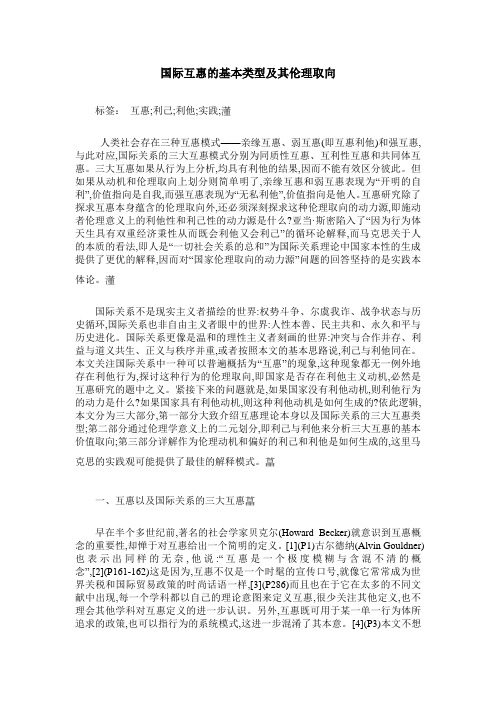
国际互惠的基本类型及其伦理取向标签:互惠;利己;利他;实践;人类社会存在三种互惠模式——亲缘互惠、弱互惠(即互惠利他)和强互惠,与此对应,国际关系的三大互惠模式分别为同质性互惠、互利性互惠和共同体互惠。
三大互惠如果从行为上分析,均具有利他的结果,因而不能有效区分彼此。
但如果从动机和伦理取向上划分则简单明了,亲缘互惠和弱互惠表现为“开明的自利”,价值指向是自我,而强互惠表现为“无私利他”,价值指向是他人。
互惠研究除了探求互惠本身蕴含的伦理取向外,还必须深刻探求这种伦理取向的动力源,即施动者伦理意义上的利他性和利己性的动力源是什么?亚当·斯密陷入了“因为行为体天生具有双重经济秉性从而既会利他又会利己”的循环论解释,而马克思关于人的本质的看法,即人是“一切社会关系的总和”为国际关系理论中国家本性的生成提供了更优的解释,因而对“国家伦理取向的动力源”问题的回答坚持的是实践本体论。
国际关系不是现实主义者描绘的世界:权势斗争、尔虞我诈、战争状态与历史循环,国际关系也非自由主义者眼中的世界:人性本善、民主共和、永久和平与历史进化。
国际关系更像是温和的理性主义者刻画的世界:冲突与合作并存、利益与道义共生、正义与秩序并重,或者按照本文的基本思路说,利己与利他同在。
本文关注国际关系中一种可以普遍概括为“互惠”的现象,这种现象都无一例外地存在利他行为,探讨这种行为的伦理取向,即国家是否存在利他主义动机,必然是互惠研究的题中之义。
紧接下来的问题就是,如果国家没有利他动机,则利他行为的动力是什么?如果国家具有利他动机,则这种利他动机是如何生成的?依此逻辑,本文分为三大部分,第一部分大致介绍互惠理论本身以及国际关系的三大互惠类型;第二部分通过伦理学意义上的二元划分,即利己与利他来分析三大互惠的基本价值取向;第三部分详解作为伦理动机和偏好的利己和利他是如何生成的,这里马克思的实践观可能提供了最佳的解释模式。
一、互惠以及国际关系的三大互惠早在半个多世纪前,著名的社会学家贝克尔(Howard Becker)就意识到互惠概念的重要性,却惮于对互惠给出一个简明的定义。
考虑羊群效应的低碳创新网络搭便车行为演化

考虑羊群效应的低碳创新网络搭便车行为演化作者:汪熠杰吕宛青张一来源:《华侨大学学报·哲学社会科学版》2024年第01期摘要:低碳创新是实现“碳达峰、碳中和”目标的关键动力与路径,由众多创新主体组成的低碳创新网络则是我国低碳创新的主要力量。
然而,合作网络中的搭便车行为,却严重制约了我国低碳创新网络的稳定发展与深度创新。
为此,在相关研究基础上考虑羊群效应理论,并引入Moran过程构建随机博弈模型,对低碳创新网络中搭便车行为的形成演化进行分析。
结果表明:首先,当不考虑羊群效应或羊群效应较低时,低碳创新网络仅存在唯一稳定状态。
而当羊群效应作用较强时,创新网络中将存在多重稳定状态;其次,低碳创新网络中搭便车行为羊群效应大小受合作创新成本与收益、制度惩罚实施力度与概率、双重外部性、专利政策及创新成功率等因素影响;最后,根据博弈结果和数值模拟,对我国低碳创新网络中搭便车行为的防治提供政策建议与理论支持。
关键词:低碳创新;碳中和;羊群效应;稳定性;随机博弈作者简介:汪熠杰,云南财经大学工商管理博士后流动站博士后,管理学博士,主要研究方向:低碳经济、旅游经济(Email:****************;云南昆明 650500)。
吕宛青,云南大学工商管理与旅游管理学院教授、博士生导师,主要研究方向:旅游经济、企业管理。
张一,四川大学商学院博士研究生,主要研究方向:行为经济、创新研究(四川成都610064)。
基金项目:国家自然科学基金项目“西部民族地区旅游地利益诉求演化机理及适应性机制研究”(71663061);云南省教育厅科学研究基金项目“乡村旅游地居民亲环境行为影响与促进机制研究”(2022Y091);西藏教育厅科学研究基金项目“西藏高校产教融合影响因素及水平提升研究”(xzjykt521001);云南财经大学科学研究基金项目“复杂网络视阈下新乡贤助力民族村寨旅游高质量发展的机制研究”(80059900421)中图分类号:D23 文献标识码:A文章编号:1006-1398(2024)01-0076-17随着全球气候的恶化与资源环境紧缩问题的加剧,发展低碳经济,实现节能減排,已成为国际社会的普遍共识【张新红、杨静怡:《福建省异质性产业节能减排的绿色技术路径选择》,《华侨大学学报(哲学社会科学版)》,2019年第3期,第64—79页。
人们为什么要说谎,英文作文

人们为什么要说谎,英文作文英文回答:Lying, a complex and multifaceted behavior, has captivated the attention of scholars from diverse disciplines. Reasons for lying range from self-protection to social conformity to the pursuit of personal advantage. Here are some of the most commonly cited motives for lying:Self-protection: One of the most fundamental reasons people lie is to protect themselves from negative consequences. This could include lying to avoid punishment, criticism, or rejection. People may also lie to maintain a positive self-image or to conceal embarrassing or damaging information about themselves.Impression management: Lying is often used as a tool for impression management, aiming to create a favorable or desired image of oneself in the eyes of others. Individuals may exaggerate their accomplishments, downplay theirshortcomings, or fabricate stories to enhance their social status or attractiveness.Social conformity: The desire to conform to social norms and expectations can also drive people to lie. For example, people may lie about their beliefs or opinions to fit in with a group or to avoid social disapproval. Conformity pressures can be particularly strong in situations where one feels like an outsider or a minority.Personal gain: Lying can be used to achieve personal advantages, such as financial gain, career advancement, or romantic success. Individuals may lie to obtain benefits, resources, or opportunities that they would not otherwise have access to.Altruistic motives: In some cases, lying can be motivated by altruistic intentions. For example, people may lie to protect someone they care about or to avoid causing them harm. However, it is important to note that even well-intentioned lies can have negative consequences and undermine trust.中文回答:人们为什么要说谎。
惩罚的英语短语
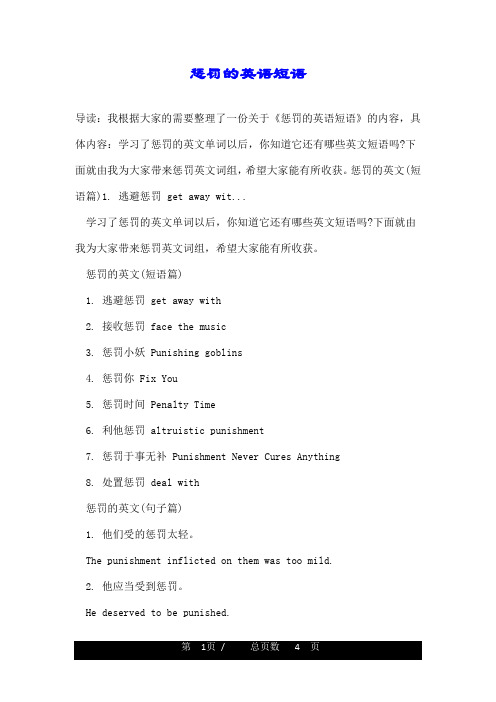
惩罚的英语短语导读:我根据大家的需要整理了一份关于《惩罚的英语短语》的内容,具体内容:学习了惩罚的英文单词以后,你知道它还有哪些英文短语吗?下面就由我为大家带来惩罚英文词组,希望大家能有所收获。
惩罚的英文(短语篇)1. 逃避惩罚 get away wit...学习了惩罚的英文单词以后,你知道它还有哪些英文短语吗?下面就由我为大家带来惩罚英文词组,希望大家能有所收获。
惩罚的英文(短语篇)1. 逃避惩罚 get away with2. 接收惩罚 face the music3. 惩罚小妖 Punishing goblins4. 惩罚你 Fix You5. 惩罚时间 Penalty Time6. 利他惩罚 altruistic punishment7. 惩罚于事无补 Punishment Never Cures Anything8. 处置惩罚 deal with惩罚的英文(句子篇)1. 他们受的惩罚太轻。
The punishment inflicted on them was too mild.2. 他应当受到惩罚。
He deserved to be punished.3. 老师宣布她将惩罚那个坏学生。
The teacher blazoned she would punish the bad student.4. 那个男孩逃跑来逃避惩罚。
The boy avoided punishment by running away.5. 要惩罚的话就惩罚我好了。
Punish me if you are to punish someone.6. 上述惩罚是对一家主要银行采取的最为严厉的惩罚之一。
The penalty is one of the harshest against a leading bank.7. 以眼还眼一种惩罚,用受害人所遭受的来惩罚犯罪人Punishment in which an offender suffers what the victim has suffered.8. 惩罚者的惩罚成本的一个货币单位。
绿巨人浩克Hulk中英剧本
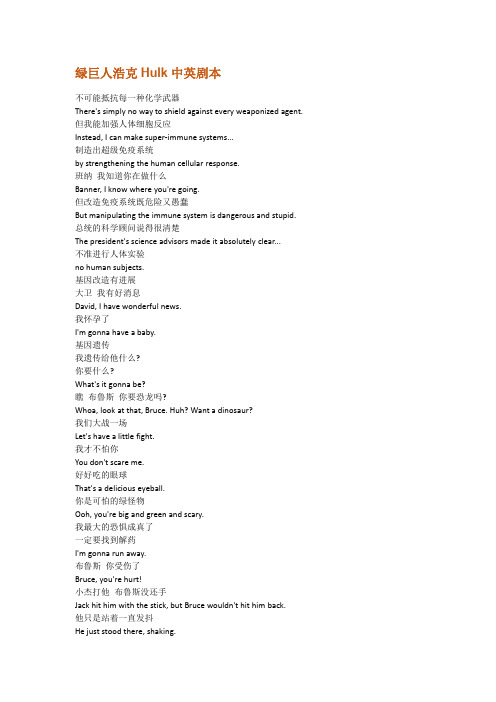
绿巨人浩克Hulk中英剧本不可能抵抗每一种化学武器There's simply no way to shield against every weaponized agent.但我能加强人体细胞反应Instead,I can make super-immune systems...制造出超级免疫系统by strengthening the human cellular response.班纳我知道你在做什么Banner,I know where you're going.但改造免疫系统既危险又愚蠢But manipulating the immune system is dangerous and stupid.总统的科学顾问说得很清楚The president's science advisors made it absolutely clear...不准进行人体实验no human subjects.基因改造有进展大卫我有好消息David,I have wonderful news.我怀孕了I'm gonna have a baby.基因遗传我遗传给他什么?你要什么What's it gonna be?瞧布鲁斯你要恐龙吗?Whoa,look at that,Bruce.Huh?Want a dinosaur?我们大战一场Let's have a little fight.我才不怕你You don't scare me.好好吃的眼球That's a delicious eyeball.你是可怕的绿怪物Ooh,you're big and green and scary.我最大的恐惧成真了一定要找到解药I'm gonna run away.布鲁斯你受伤了Bruce,you're hurt!小杰打他布鲁斯没还手Jack hit him with the stick,but Bruce wouldn't hit him back.他只是站着一直发抖He just stood there,shaking.好怪哦他一声也不吭Yeah,strange he didn't make a peep.一般小孩会哭得死去活来Any other kid would've wailed his head off.布鲁斯就是这么地…That's Bruce.He's like that.压抑He's just so...bottled up.我在实验室找到人类血液样本The samples we found in your lab...they were human blood.你违反了规定You've ignored protocol.你无权干涉我的实验You had no right snooping around in my lab.这是我的事That's my business.错了这是政府公事Wrong,Banner.It's government business你不准再做实验and you're off the project.全员注意故障安全系统启动Attention,all personnel.Fail-safe has been initiated.半小时后清除伽玛辐射污染Gamma decontamination will occur in30minutes!立刻撤离Evacuate immediately!我重覆立刻撤离I repeat,evacuate immediately!伊蒂Edith?怎么回事?what's going on?我们得谈谈I gotta talk to you,Edith.布鲁斯留在这儿Bruce,stay here.你在干什么?大卫住手David!No!大卫听我说David,please stop it!No!布鲁斯快醒醒儿子Bruce.Bruce,wake up,son.布鲁斯Bruce.Bruce.你又做了噩梦?Another nightmare?不晓得我不记得了I don't know.I don't remember.嗨妈Hi,Mom.你就要去上大学了Already off to college.我会很想你Gonna miss you terribly.我也会很想你I'll miss you too.来过来Please,come here.看看你你会成为伟大科学家Look at you,Soon to be a great scientist.也许吧谁知道呢?I guess.我知道I mean,who knows?I do.你身上有什么…很特别There's something inside you...so special.一种很了不起的能力Some kind of greatness.有一天你会让全世界知道I'm sure someday you're gonna share it with the whole world.柏克莱核能生化科技研究所我觉得保全应该…But as far as I'm concerned,security oughta be...早安柯兹勒博士Good morning.Good morning,Dr.Krenzler.我觉得应该要加强保全Security oughta be beefed up.这种地方一定要格外小心In a place like this you can't be too careful.就是今天了你有没有睡?Bruce!Big day.Did you sleep?我可是睡不着I didn't sleep.我睡得还好贝蒂在吗?I slept okay.Is Betty here?在啊She's around.老实说你的头盔有够时髦I really gotta say,seeing you in that stylin'head wear...你嫌我的安全帽很丑?You're implying something about my helmet?你活像个呆瓜谁也没你逊You look like a massive nerd,even around other scientists.你被她甩掉那天也戴这玩意吗?Can I just ask...Were you wearing the helmet while she dumped you?它保护我的金头脑哈普See,it protects my very important brain,Harper.去准备样本吧Go prep the samples.我找到你了I found you.嗨贝蒂Hey.Betty.我恨死他们了I hate them.我才刚到你说谁?Wait,I just got here.Who do we hate?审查委员会礼拜二要提案The review board.We have to make a presentation on Tuesday.Ah.你要跟我一起去And you're gonna make it with me.我该去吗?You think I should?Yeah.这种事你最在行You're great with that stuff.你只有谈到微生物和奈米微生物You start talking about microbes and nanomeds,才会稍微有点…热情you sound almost...passionate.抱歉这话太伤人I'm sorry.That was rude.没有人说一起工作很容易Look,nobody expects this to be easy,毕竟我们从前是那么…亲密us working together after being...so close.我们有亲密过吗?We were close?要是我更…Look,if I could be more...那个你知道的whatever,you know...别说了不是你的错It's not your fault.Really.谁叫我老是找性情冷淡的男友You're just a by-product of my inexplicable obsession with emotionally distant men.总有一天我会释怀I'll get over us.那就好Good for you.这次审查让我很紧张Anyway,I'm just really stressed about this review.今天没有好的成果If we don't get impressive results today,礼拜二就很难说服他们we're gonna have a really hard sell come Tuesday.那就去干活吧Well,then,let's go be impressive.哈普?Harper?你好了就开始Ready when you are.开始吧Let's hit it.安检合格吗?Are we passing inspection?安全都没问题倒数计时开始Safeties all going green.Countdown's started.释出奈米微生物Nanomeds released.奈米微生物释出四秒钟Four seconds.奈米微生物完全释出Okay,nanomeds fully dispersed.好了替小佛照伽玛射线吧Okay,let's hit Freddie with the gamma radiation.发射伽玛射线Gamma exposure.发射伽玛射线Gamma exposure.奈米微生物开始活动Nanomeds now active.奈米微生物在伤口处复制细胞Nanomeds replicating cells on border.成功了It's working.细胞修复和损坏误差值Cell copy to disassemble ratio holding within one percent.维持在百分之一内奈米微生物活动失控Imbalanced nanomed activity.你想跟审查委员说You wanna go to the review board on Monday and tell'em...我们发明杀青蛙的新方法?we've developed a brand-new method for exploding frogs?好啊这一定有市场Yeah,I think maybe there's a market for it.搞不好会发生瘟疫I mean,what if there's a plague?你才喝一罐啤酒就醉了?What have you had,Betty,like,one beer?我只是说要是青蛙从天而降I'm just sa...I'm just saying,you know,frogs start falling from the sky,他们要去找谁?who do they come to?我们肯定会一炮而红We'd be world-renowned.父母一定会很骄傲Make any parent proud.你爸妈一定以你为傲I bet they would be.他们是希望我当科学家They actually did want me to be a scientist.我是说你的亲生父母I mean,your birth parents.我永远不会知道Guess we'll never know.你怎么一直不想知道他们的事I don't understand why you don't want to find out about them.他们早就死了They're dead.我什么都不记得他们就死了They died before I can remember anything.你为什么一直要追问?Why do you always come back to this?不晓得Don't know.我猜你的内心一定有什么秘密I guess I figure there's more to you than you like to show.你不可能天生就这么冷淡I guess there couldn't be any less.绕了半天又回到老问题Right.So now we come full circle back to that.你真行Nice work,Betty.葛伦Glen.Hey.你怎么没穿军服?What happened to your uniform?我换了工作Oh,I,uh...I switched over.我还是替你父亲做事I'm still working with your father,but...不过民间包商的工作更有趣Well,you know,the military's subcontracting out all the most interesting work,and...高薪也令人无法抗拒Can't argue with a paycheck.我负责基地所有的实验室I basically run all the labs on the base now.你看起来不错you're looking good.你是遗传工程专家You're the genetics expert.啊!大学时光Ah,the good old college days.你还好吗?So,how's business?你想要什么?What do you want?我就直话直说吧All right,I'll cut to the chase.听说你的研究工作很有意思I've been hearing interesting things about what you guys are doing here.你的分子机器有很多用途Your little molecular machines have some incredible implications.你不如到亚矽工作How would you like to come work for Atheon?薪水比你现在多十倍Get paid10times as much as you earn now...你也能拥有专利权and own a piece of the patents.你说一个字就行You just have to say the word.两个字出去Two words:The door.将军?General?进来Come in.陶柏要你看这些Talbot wanted you to see this,sir.亚矽想买下一间实验室It's about a lab Atheon is targeting for acquisition 搬到沙漠基地and removal to desert base.他怎么不去找国安局?Why isn't it going through N.S.C.?这跟你女儿有关It,uh,concerns your daughter,sir.班尼呢?Hey,what happened to Benny?他不值大夜班啦?Is he not working the night shift anymore?他死了我是新来的工友Benny's dead.I'm the new guy.幸会了Good to meet you.Same.彼此彼此再拍一张-Let's try another.别拍了Mmm,no.Stay here.反正我很累I look tired anyway.你也很美Yeah,but you look great.怎么了?What's the matter?我一直在做噩梦It's these dreams,Doctor.好可怕哦I keep having them,and they're terrible.说来听听Tell me about your dream.一开始只是一个记忆Well,it starts¡it starts with a memory我第一个记忆那是我…I think it's my first memory.两岁大看到的景象It's this image I have from when I was maybe two years old.那不只是个梦?Do you think it's just a dream?我猜这件事发生在…No,I think it's something that happened...我跟我爸住的沙漠基地when I was living at a desert base with my father.这场梦继续下去Anyhow,the dream goes on and...我突然只有一个人suddenly I'm alone.太可怕了我绝不会伤害你That's terrible.You know I'd never hurt you.小狗狗Hey there.你叫什么名字?What's your name,darlin'?你叫什么?Eh?What's your name?好吧没事了Okay.It's okay.我们得谈谈I gotta talk to you,Edith.布鲁斯留在这儿Bruce,stay here!C、T、G、AC...T...G...AGG.布鲁斯Bruce.我的布鲁斯My Bruce.早葛伦来拜访Good morning.Glen dropped by.他跑来干嘛?What's he doing here?柯博士You know,Dr.Krenzler,我们一直没正式认识you and I have never had the chance to get to know each other properly.正式或非正式我都不想认识你Well,that's because I don't want to get to know you,properly or improperly.请你走So leave.我这就走Hey,no worries.让我先警告你Let me give you a little heads-up.善意收购和恶意并构There is a hairsbreadth between friendly offer...只有一线之隔and hostile takeover.我做过功课I've done my homework.你们的研究工作很棒The work you're doing here is dynamite.想想看Think:美国大兵拥有自我疗伤的能力Gls embedded with technology that makes them instantly repairable on the battlefield.专利权在我们手上in our sole possession.这是门赚钱的生意That's a hell of a business.这不是我们的目的Well,it's not what we're doing here.我们只是做科学研究We're doing the basic science for everyone.有一天我要写一本书You know,someday I'm gonna write a book...穷科学家的愚蠢理想and I'm gonna call it When Stupid Ideals Happen To Smart,Penniless Scientists.你还会再见到我In the meantime,Bruce,you will be hearing from me.葛伦的事…About Glen,I,um...没什么好说的There's nothing to talk about.好吧Okay.我只想说别担心我会处理的I just wanted to say,don't worry about him...I'll handle it.怎么处理?How?我要打给我爸I'm gonna call my father,请他施加压力ask him to exert some pressure.你跟你爸不是不说话吗?Last I heard,you and your father weren't speaking.我猜我们现在有话可说了I guess now I have something to talk with him about.电线好像短路I think this circuit's kinda fried.你最好来看看I don't know.Maybe you wanna come take a look at it.我马上来Okay,I'll be right there.发射伽玛射线伽玛射线量太高了The gamma's too high!我停不下来Bruce,I can't stop it!发射哈普快出去Harper,get out!快出来Get out!哈普没事吧?How's Harper?没事你救了他He's all right.You saved him.不过他暂时不敢回实验室了I don't think he's coming back to the lab for a while,though.我不明白这怎么可能I don't understand how this is possible.你应该没命的You should be dead.成功了They worked¡奈米微生物the nanomeds.我感觉很棒I mean,I feel great.它们把我的伤势治好了I feel like...I don't know.They must have,like,fixed me.它们杀死所有的实验对像Bruce,they've killed everything else that they've come into contact with.医生有没有…Are you sure the doctor checked?他替我做过全身检查The doctor gave me the full workup.他想知道我吃了什么仙丹灵药He wants to know where he can get what I'm taking.我的元气百分百I'm a hundred percent.比百分百更多More.什么意思?What do you mean?我的膝盖不是受过伤吗?Remember my bad knee?现在完全好了Well,now it's my good knee.这不好笑Bruce,this isn't funny.我看到你你差点没命I was watching you.You were gonna die,我得眼睁睁看着你死and I was gonna have to watch you die.贝蒂对不起Betty...I'm sorry.我是说真的Really.我不会爆炸啦Hey,I'm not gonna explode.Okay?你应该休息一下You should get some rest.我真的很好And I'm fine.Really.从来没这么好过I've never felt better.你的名字不是柯兹勒Your name is not Krenzler.是班纳It's Banner.什么?What?你原姓班纳Your name...it's Banner.布鲁斯班纳Bruce Banner.你是怎么进来的?Bruce.How did you get in here?我在这儿工作I work here now.我在实验室值大夜班In the labs.The late shift.这样才能接近你It keeps me close to you.你跟罗小姐都工作到很晚You always work so late yourself with your friend Miss Ross.别动让我来No,no.Please.Please.Let me.你受了伤You're not well.你发生严重的意外You've had a terrible accident.你在想你为什么没死You're wondering why you're still alive.你身上一定有什么You're thinking there's something inside.与众不同Something different...无法解释的东西inexplicable.我能帮你了解它如果你愿意I can help you understand,if you'll let me.如果你肯…If you'll...原谅我forgive me.这位先生Look,mister,我不知道我要原谅你什么I'm sure I have nothing to forgive you for.请你马上离开So perhaps you should leave now.我不会有事I'll be fine.你一定要知道You must know.也许你不信You may not want to believe it,但我从你的双眼看得出来but I can see it in your eyes.它们跟你母亲的一样So much like your mother's.你当然是我的亲生骨肉Of course,you're my flesh and blood.不过你也是别的东西But then,you're something else too,aren't you?你是我的儿子My physical son,也是我的心血结晶but the child of my mind too.不你在说谎No.You're lying.我小时候父母就双亡My parents died when I was a small boy.不对No,no,that's not true.这是他们编的谎言That's what they wanted you to believe.那次实验和意外是最高机密The experiments,the accident...all top secret.我被关了三十年They put me away for30years.整整三十年Thirty years!远离你Away from you.远离我的工作Away from our work.但他们不能关我一辈子But they couldn't keep me forever.他们得承认我没发疯After all,I'm sane.They had to admit it.你要明白这一切You see,everything¡这些年来你费尽心思your extraordinary mind...寻找的东西has been seeking all these years...它就在你的体内it's been inside you.现在我们要了解它、掌控它Now we will understand it.We will harness it.别接一定是罗小姐No,don't answer it.It's Miss Ross again.你要知道她一件事There's something you need to know about her,Bruce.令人不安的事Something troublesome.让我保护你Let me protect you from her.不出去No.Get out.出去!-Bruce...-Get out!坐好-Sit!你最好别乱发脾气We're gonna have to watch that temper of yours.你真的没事?You sure you're okay?没事能起床真好Yeah,just glad to be out of bed.我收到我爸的留言Got a message from my father.他要来看我He's coming to see me.你爸?Your father?Mmm.几时?When?他一小时后到Lands in about an hour.奇怪的是他先打给我The funny thing is,he called me.嗨爸爸Hi,Dad.Hello,Betty.哈罗贝蒂Here,ma'am.Thanks.谢谢You're welcome.Sir?Thank you.不客气You're welcome.我就直话直说吧Look,I'm gonna get right to it.这跟葛伦有关对吧?It's about Glen,isn't it?他鬼鬼祟祟跑来我实验室He's been snooping around my lab.他看到一些事Glen noticed some things,所以请我来收购一下asked me to make some inquiries.你是来质问我吗?Are you here to question me?不是No.我发现一些令人惊讶的事实We've turned up some surprising things.你的同事柯兹勒This Krenzler you work with...你知道他的真实身份吗?you know who he really is?你到底对他了解多少?How much do you actually know about him?问题是…I think the question is,你对他了解多少?what is it that you know about him?我未经授权…-Well,right now,I'm not...-Not at liberty to disclose it to me.Right.Right.你未经授权不能向我透露Not at liberty to disclose it to me.Right.Right.你知道我本来希望You know,I think I was hoping that¡也许这次你是真的想见我maybe this time you just...honestly wanted to see me again.你误解了You've got this all wrong,Betty.是吗?Do I?是的Yes.我是真的想见你I do want to see you.我真希望能相信你I really wish that I could believe you.柯兹勒血液样本这些年来你费尽心思Everything...寻找的东西your extraordinary mind has been seeking all these years,它就在你的体内it's been inside you.这是柯博士Hi,you've called Dr.Krenzler.请留言我会尽快回电Please leave a message and I'll call you right back.布鲁斯你在吗?Bruce,hey.Are you there?我把事情搞砸了我爸…Look,um,I think I screwed up.他怀疑你做了什么My father...It's like he suspects you of something.I don't know.我太没耐心了没听他说I was so impatient,like always.I didn't hear him out.I don't know,l¡他们好像在打实验室的主意I just think that they're planning something with the lab.打电话给我再见So,um,uh...Call me.Okay?Bye.实验室发生骚动Dispatch!Dispatch!We have a415at the lab!快派警察过来快点!Send Berkeley P.D.Now!Send'em now!发生什么事?David,what's going on?我们得谈谈I gotta talk to you,Edith.布鲁斯留在这儿Bruce,stay here.我的好儿子My Bruce.布鲁斯?Bruce?实验室发生爆炸There was some sort of explosion.他们不让我们进去They wouldn't let us into the building.我很担心你I was worried about you.我没事Well,I'm okay.你昨晚发生什么事?What happened to you last night?我做了一场好真实的梦I had the most vivid dream.我就像婴儿呱呱落地It was like being born.探出头来透气Coming up for air.光亮迎面而来我大声嚎叫Light hitting my face.Screaming.心脏猛烈跳动My heartbeat¡it was,like,boom¡一直怦怦响boom...你在实验室吗?Were you at the lab?不在No.但是有什么在But something...还有那个人And there was that man.牵着狗的那个人The one with the dogs.谁?Who?新来的工友That new janitor.他说他是我爸He said he was my father.我去开门I'll get it.我爸爸My father.真没想到My,my.原来你就是布鲁斯班…So this is the young Bruce Ban...柯兹勒Krenzler.昨晚你在实验室掉了东西I think you left something in your lab last night.米契送我女儿出去Mitchell.Escort my daughter outside.我待会就来I'll join her shortly.我要留下来I'd rather stay here.Now,Betty.没关系我没事It's okay.I'll be fine.看好他我马上回来Keep him under observation.I'll be back.什么?What?你的朋友Your friend in there.很可能被扯进一些危险的事There's a good chance he's caught up in some very bad business.一些未了的事Unfinished business.我一定要查清楚And I promise you,I'm gonna get to the bottom of it.我保证会好好照顾他You have my word I'll make sure he's cared for.从现在起他被软禁But as of right now,he is incommunicado.这几天你最好离他远一点And for the next few days at least,you're gonna stay away from here.我这是为了你好For your own good.这是新工友的住址?Okay,and that's for the new guy on the night shift,right?太好了感激不尽Great.Thank you.I appreciate it.罗博士Dr.Ross.真没想到How unexpected.请进Please come in.很抱歉冒昧拜访I'm sorry to just show up at your house like this.我是来请教一件事I came to ask you something that...其实我无权过问I really have no business asking.他跟你说了?He told you?他说你跟他谈过He said you talked to him.Please sit down.布鲁斯昨晚在实验室Bruce was at the lab last night.他说你也在他不太记得了He said that you were there too.But he can't remember much about it.我想知道发生什么事I need to find out what happened.你想知道他有哪里不对劲So,you want to know,uh,what's wrong with him¡然后设法救他so you can fix him?把他治好、改变他Cure him,change him.我父亲是将军My father's with the military.他认为他对国家安全造成威胁He seems to think he's involved in some kind of threat to national security.你父亲…罗斯Your father.Ross.你把你爸找来对付他You brought your father down upon his head?你什么也不懂How little you understand,Miss Ross,你的无知也会造成极大危险and how dangerous your ignorance has become.抱歉?I'm sorry.别道歉Don't be sorry.我儿子与众不同My son is unique.所以你无法了解他That's why you can't relate to him.就因为他与众不同And because he is unique,这世界容不下他的存在the world will not tolerate his existence.Will they?但是你…But you¡你试过对吧?you try,don't you?像你这种大美女Yes.And a very beautiful woman like you,他一定无法抗拒你的魅力your attentions can't be completely unwanted.对不对?Can they?当然不行No.你用水汪汪的大眼睛Not with eyes like yours,充满爱意地看着他watching expectantly,lovingly.但是想帮助他已经来不及了But I'm afraid we're both too late to help him.你和我都不能为他做什么There's nothing I can do for him or for you.而且Besides,他表明不想跟我扯上关系he's made it clear he wants nothing to do with me.这是他的选择His choice.恕我失陪我要去忙了Now,if you'll excuse me,Miss Ross,I have some work to do.别怕那些狗你不会有事And don't worry about the dogs.You'll be fine.只要你不瞪着它们Just don't look'em in the eyes.再见Good-bye.他才出来一个月实验室就出事He gets released,and a month later your lab is destroyed.真是巧What a coincidence.告诉我他人在哪儿So you're not gonna tell me where he is,are ya?我也很想帮忙但我不知道How many times do I have to tell you?I'd like to help you,but I just don't know.你知道我是谁吧?You know who I am.Right,Banner?你是高阶将领贝蒂的父亲Your Betty's father.You're a high-ranking general.Let's cut the crap.少装了我是把你爸关起来的家伙I'm the guy who had your father tossed away,and a lot more like him,有必要我也会把你抓去关起来and I'll do the same with you if I feel so disposed.是你把他关起来别问我You understand?If you had him tossed away,then why are you asking me?我什么也不记得I don't remember.我只知道我爸死了I was always told my father was dead.别跟我玩游戏Don't play with me!你看到那一切都四岁大了You were four years old when you saw it.我看到什么?When I saw what?你也在场怎么会不记得?You were right there.How could anyone forget a thing like that?什么?What?被压抑的记忆Oh,some more repressed memories.请你告诉我Just tell me.很遗憾I'm sorry,son.你的情况比我想像的更糟You're an even more screwed-up mess than I thought you'd be.在查清楚之前Until we get to the bottom of this,你的实验室成为机密军事用地your lab has been declared a top-secret military site...你没有资格回去and you're not gonna get a security clearance to get back into it...也不能到任何实验室工作or any other lab that's doing anything more interesting than...除非你只是研究最新草本发胶trying to figure out the next generation of herbal hair gel.还有一件事One more thing.要是你敢再靠近我女儿一步If you ever come within a thousand yards of my daughter again,我就把你抓去关一辈子I'll put you away for the rest of your natural life.乖狗狗Dogs!去吧Go!去找她Go get her!别让任何人挡路And let nothing stand in your way!快去吧Go!他们想用同样的方法把你除掉So,they think they can just throw you away as they did me.我怎么了?你对我做什么?What's wrong with me?What did you do to me?我今天有一个访客I got a visit today.不受欢迎的访客A very unwelcome visit.我也是逼不得已的I'm afraid my hand is being forced.你到底对我做了什么?What did you do to me?你很想知道对吧?You so much want to know,don't you?但是再多的解释也比不上…But I think no explanation will serve you half as well...亲身的体验as the experience.何况我自己也不是很清楚In any case,I still don't quite understand it myself.当时我只想好好做实验If they'd only let me work in peace...他们却不放过我Of course,my betters would have none of that.你拿自己做人体实验So you experimented on yourself,didn't you?你把什么遗传给我?And passed on to me...what?一种改造基因An alteration.Genetic.我猜你可以说那是种畸形吧A deformity.I guess you could call it that.但是也拥有无穷力量But an amazing strength too.现在它被释放我就能加以利用And now,finally unleashed,I can harvest it.不你不能这么做No.You'll do no such thing.我要把它找出来进行治疗I will isolate it and treat it myself.趁它没造成伤害杀了它I'll remove it and I'll kill it before it does any real harm.你跟你的贝蒂一定很想毁了它I'll bet you and your Betty would love to destroy it.但是你能毁了你自己吗?But would you really destroy part of yourself?应该不能I don't think so.至于贝蒂And as for Betty,我已经派我的忠犬去拜访她I'm sending her a surprise visit from some four-legged friends of mine.我培养了你的DNAYou see,I managed to culture some of your very own DNA,Bruce,效果真的很惊人and the results are tremendous.虽然不稳定但是力量强大They're unstable,but very powerful.我的DNA怎么了?What about my DNA?先看看贝蒂觉得怎么样吧Let's just wait and see what Betty makes of the results,huh?不行你疯了我绝不允许No.You're crazy.I won't let you.放开我Get your hands off of me.Talbot,what's this...滚进去我要跟你谈谈Inside,asshole.I wanna talk to you.我父亲去找贝蒂Listen,my father's going after Betty...你竟敢背着我找罗斯对付我What makes you think you can go behind my back and get Ross to cut me out,huh?听我说贝蒂有危险Listen to me!Betty's in trouble!你这可怜的怪胎You pathetic freak.贝蒂会被杀死Betty's in danger.我警告你I swear to you,she'll be killed.你没有资格来威胁我I can state the obvious.Something tells me you aren't in much of a position to bemaking stupid threats to anyone.陶柏?Talbot.干嘛?Yeah?你惹我生气了You're making me angry.是吗?Oh,am I?开枪!Ohh!Oh!I got him!Open fire!他派变种狗来找你Bruce?He sent these dogs,didn't he?不过我宰了它们But I killed them!一定是因为奈米微生物和伽玛射线My God.It must be the nanomeds.It must be the gamma exposure.但我们没见过这种效果But we've never seen any effect like this before.不另有原因No.Deeper.伽玛射线触发了某种东西The gamma just unleashed what was already there.触发了什么?Unleashed what?我自己Me.它It.没事It's okay.Shh.It's okay.那些动物是什么?What were those animals?我爸派来的My father sent them.他真的是我爸He is my father.他要我改变He wanted me to change.他要我变成可怕的绿巨人He wanted me to change into that mindless hulk.为什么?Why would he want that?你记得什么吗?Can you remember anything?在你改变时?Is there anything from when you were changed?这就像一场梦It was like a dream.梦里有什么?About what?愤怒Rage.力量Power.自由And freedom.爸爸?Hello?Sir.Hello.Dad?贝蒂你没事吧?Betty!Are you all right?我好害怕我需要你的帮忙I'm scared.I need your help.你在哪里?Where are you?你好吗?How are you?还好吧Okay,我猜I guess.你的愤怒启动了奈米微生物I think that somehow your anger is triggering the nanomeds.怎么会?How could it?它们对肉体伤害才有反应We designed them to respond to physical damage.精神伤害也会引起生理反应Emotional damage can manifest physically.像是什么?Like what?严重的心理创伤Serious trauma.被压抑的记忆Repressed memories.你爸逼问我小时候发生的事Your father grilled me about something that happened to me from early childhood...他说我应该记得that I'm supposed to remember.是吗?He did?听起来很严重It sounded bad,but...但是我真的不记得I honestly don't remember.我最担心的是The thing that worries me...肉体伤害有限a physical wound is finite,精神伤害却是难以衡量but with emotions,很可能引起连锁反应what's to say it won't just go on and on and start a chain reaction?你知道我最害怕什么吗?You know what scares me the most?当我开始改变When it happens,when it comes over me¡当我无法抗拒、完全失去控制and I totally lose control,我喜欢那种感觉I like it.我抱住你了对不起It's okay.I got you.I'm sorry.你没事这只是麻醉枪You'll be okay.It's just to make you sleep.目标倒下Target down.目标被捕Target secure.我要带你到安全地方I'm going to take you someplace safe.Okay?Bruce?立正Clear!Attention on deck.继续吧Carry on.他被我们埋在地底深处We're buried out here in the middle of nowhere.你打算把他关多久?How long are you gonna keep him sedated?有必要关一辈子。
Proc[1]. R. Soc. B-2006-Hauert-2565-71
![Proc[1]. R. Soc. B-2006-Hauert-2565-71](https://img.taocdn.com/s3/m/559b648c8762caaedd33d41b.png)
doi: 10.1098/rspb.2006.3600, 2565-2571273 2006 Proc. R. Soc. BChristoph Hauert, Miranda Holmes and Michael Doebeli cooperation in public goods gamesEvolutionary games and population dynamics: maintenance ofReferences/content/273/1600/2565.full.html#ref-list-1This article cites 28 articles, 5 of which can be accessed free Email alerting servicehere right-hand corner of the article or click Receive free email alerts when new articles cite this article - sign up in the box at the top/subscriptions go to: Proc. R. Soc. B To subscribe to This journal is © 2006 The Royal SocietyEvolutionary games and population dynamics:maintenance of cooperationin public goods gamesChristoph Hauert 1,*,Miranda Holmes 2,†and Michael Doebeli 21Program for Evolutionary Dynamics,Harvard University,One Brattle Square,Cambridge,MA 02138,USA 2Departments of Zoology and Mathematics,University of British Columbia,6270University Boulevard,V ancouver,BC V6T 1Z4,CanadaThe emergence and abundance of cooperation in nature poses a tenacious and challenging puzzle to evolutionary biology.Cooperative behaviour seems to contradict Darwinian evolution because altruistic individuals increase the fitness of other members of the population at a cost to themselves.Thus,in the absence of supporting mechanisms,cooperation should decrease and vanish,as predicted by classical models for cooperation in evolutionary game theory,such as the Prisoner’s Dilemma and public goods games.Traditional approaches to studying the problem of cooperation assume constant population sizes and thus neglect the ecology of the interacting individuals.Here,we incorporate ecological dynamics into evolutionary games and reveal a new mechanism for maintaining cooperation.In public goods games,cooperation can gain a foothold if the population density depends on the average population payoff.Decreasing population densities,due to defection leading to small payoffs,results in smaller interaction group sizes in which cooperation can be favoured.This feedback between ecological dynamics and game dynamics can generate stable coexistence of cooperators and defectors in public goods games.However,this mechanism fails for pairwise Prisoner’s Dilemma interactions and the population is driven to extinction.Our model represents natural extension of replicator dynamics to populations of varying densities.Keywords:evolutionary game theory;cooperation;Prisoner’s Dilemma;population dynamics1.INTRODUCTIONCooperative behaviour is abundant in animal and human societies (Binmore 1994;Colman 1995;Dugatkin 1997;Doebeli &Hauert 2005).Well-known examples include vampire bats regurgitating blood to feed hungry con-specifics (Wilkinson 1984),sticklebacks inspecting pred-atory pikes preferably in pairs (Milinski 1987),alarm calls from watchful sentinels warning other meerkats from predators (Clutton-Brock et al .1999),musk oxen defend-ing their young against wolves in groups (Wilkinson &Shank 1977),etc.In all these examples,cooperative individuals provide a benefit to one or more individuals at some cost to themselves.However,this behaviour is prone to exploitation by defectors that readily accept support but avoid the costs of assisting others.In the complex society of humans,social interactions lead to multifaceted dilemmas of cooperation.This is most apparent in the consumption of various kinds of public resources,which include public transportation,social welfare,drinking water or clean air.All such resources are prone to exploitation and overuse,as exemplified by the metaphor of the The tragedy of the commons (Hardin 1968).Over the past decades,a number of mechanisms have been suggested which are capable of supporting cooperationin absence of genetic relatedness.Most notably,this includes repeated interactions and direct reciprocity (Trivers 1971;Axelrod &Hamilton 1981),punishment (Clutton-Brock &Parker 1995;Fehr &Ga ¨chter 2002),spatially structured populations (Nowak &May 1992;Hauert &Doebeli 2004)or voluntary participation in social interactions (Hauert et al .2002b ).Unique to humans is apparently the capacity for indirect reciprocity (Alexander 1987;Nowak &Sigmund 1998,2005)and the internalization of benefits as a foundation for moral systems.Traditionally,the problem of cooperation in social dilemmas (Dawes 1980;Hauert et al .2006)is investigated by means of the game theoretical models of the Prisoner’s Dilemma for pairwise interactions and,more generally,public goods games for groups of interacting individuals (Kagel &Roth 1995).In a typical public goods experiment,an experimenter endows,for example,four players with 10dollars each.All players then have the opportunity to invest their money into a common pool knowing that the experimenter will double the total amount and divide it equally among all participants,irrespective of whether they contributed.Thus,if every-body invests their money,each player ends up with 20dollars,i.e.doubles the invested money.However,every player faces the temptation to defect,because each invested dollar returns only 50cents to the investor.Consequently,the rational,selfish solution is to withhold the money and attempt to free ride on the otherplayers’Proc.R.Soc.B (2006)273,2565–2570doi:10.1098/rspb.2006.3600Published online 5July 2006*Author for correspondence (christoph_hauert@).†Present address:Courant Institute of Mathematical Sciences,New Y ork University,251Mercer Street,New Y ork,NY 10012,USA.Received 7February 2006Accepted 28April 20062565q 2006The Royal Societycontributions—but if everybody follows this reasoning,no one increases the initial capital and foregoes the benefits of the public good.In formal terms,the payoffs for cooperators and defectors in a group with k cooperators is given byP D ðk ÞZ r kcN ;ð1:1a ÞP C ðk ÞZ P D ðk ÞK c ;ð1:1b Þwhere r denotes the multiplication factor,c the cooperativeinvestment and N the size of the group engaging in public goods interactions.For simplicity,the costs c are set to unity in the remainder of the text.Note that for pairwise interactions (N Z 2),the public goods formalism can be easily mapped onto the traditional formulation of the Prisoner’s Dilemma in terms of costs that a cooperator incurs and benefits that accrue exclusively to theirinteraction partners (Hauert &Szabo´2003).In populations of interacting individuals,the dynamics of cooperators and defectors in the public goods game is determined by their respective payoffs obtained in randomly formed groups of N individuals.Thus,any given focal individual finds itself in a group with N K 1other individuals.If x is the frequency of cooperators in the population,then the chance that k of those other individuals are cooperators is N K 1k !x kð1K x ÞN K 1K k :This probability is independent of whether the focal individual is a cooperator or a defector.Therefore,every focal individual encounters the same expected number of cooperators,and hence the same expected payoff from the other players during game interactions.From this it follows that the only determinant of success in the well-mixed public goods game is the payoff that the focal individual receives from itself.This payoff is zero if the focal individual is a defector,and is equal to ðr =N K 1Þc if the focal individual is a cooperator.The traditional formulation of public goods games requires 1!r !N ,such that defectors are better off and x Z 0is globally stable.Conversely,for r O N ,the social dilemma posed by the public goods game is relaxed and cooperation dominates.However,also note that even in this case,defectors are better off than cooperators in any group consisting of both types.The fact that evolution nevertheless favours cooperation represents an instance of Simpson’s paradox (Simpson 1951;Hauert et al .2002b ).This follows by noting that in this case cooperators receive,on average,higher payoffs than defectors according to the argument given above.The basic idea of the present paper is that if the public goods game is played in populations of varying densities,then the effective group size S of the public goods interactions also varies.Small population densities result in small effective group sizes and vice versa if population densities are large.Assuming that birth rates are proportional to payoffs,population growth is small or negative if defectors abound,because payoffs in groups with many defectors are low according to equations (1.1a )and (1.1b ).However,if population densities decrease,then the effective interaction group size S also decreases until eventually r O S holds and cooperation is favoured.Thus,we expect scenarios where large population densities favour defection,leading to a decrease in population density and hence to a decrease in S ,which,in turn,favours cooperation.Here,we show that this feedback between game dynamics and ecological dynamics can maintain cooperation and lead to stable coexistence of cooperators and defectors.2.GAME DYNAMICS AND POPULATION DYNAMICS In order to combine game dynamics and population dynamics in a replicator equation,we assume that x denotes the fraction of cooperators,y the fraction of defectors and z Z 1K x K y the fraction of empty space.Thus,x C y denotes a normalized population density,such that 0corresponds to extinction and 1is the maximal population density.The fractions x and y determine the average payoffs of cooperators,f C ,and of defectors,f D ,at any given point in time,as detailed below.T o determine the dynamics of x ,y and z ,we assume that cooperators and defectors die at a constant rate d and give birth at a rate proportional to their average payoffs.We also assume that reproduction can only occur into empty space,so that birth rates are proportional to z .This leads to the following population dynamic model:_xZ x ðzf C K d Þ;ð2:1a Þ_yZ y ðzf D K d Þ;ð2:1b Þ_z Z K _x K _y Z ðx C y Þd K z ðxf C C yf D Þ:ð2:1c ÞThis system of equations represents a natural extension of the replicator dynamics (Taylor &Jonker 1978;Hofbauer &Sigmund 1998).If the population density x C y is kept constant ð_z Z 0Þby adjusting the death rate accordingly,i.e.by setting d Z z f (where f Z ðxf C C yf D Þ=ð1K z Þdenotes the mean fitness),then the traditional replicator dynamics is recovered.The average payoffs or fitnesses f C and f D are determined by public goods interactions in randomly formed groups.These interaction groups are formed by interpreting the densities x ;y ;z as probabilities for drawing a particular strategy and for failing to find a participant,respectively.The general idea is that for large proportions of empty space z individuals typically find themselves in small groups of interacting individuals,and vice versa if z is small.Specifically,we envisage a scenario in which interaction groups are formed randomly in such a way that the available N places are randomly filled with either cooperators or defectors,or are left empty,according to the probabilities x ,y and z ,respectively;in particular,if z O 0individuals typically find themselves in interaction groups of size S !N .Thus,the chance that an individual finds itself in a group of size S %N is given by the chance to find S K 1interaction partners:N K 1S K 1 !ð1K z ÞS K 1z N K S :ð2:2ÞIf an individual finds itself in a group of size S ,it faces m cooperators and S K 1K m defectors among its S K 1interaction partners with probability x 1K z m y 1K z S K 1K m S K 1m:2566 C.Hauert and others Population dynamics in public goods games Proc.R.Soc.B (2006)It follows that the average payoffs to defectors and cooperators,P DðSÞand P CðSÞ,in a group of size S areP DðSÞZ rSX S K1m Z0x1K zm y1K zS K1K m S K1mmZ rx1K z1K1S;ð2:3aÞP CðSÞZ P DðSÞC rK1:ð2:3bÞT aking the weighted average over all possible group sizes S,with the weights given by the probabilities described by equation(2.2),yields the averagefitness of defectors and cooperators asf D ZX NS Z2N K1S K1!ð1K zÞS K1z N K S P DðSÞ;f C ZX NS Z2N K1S K1!ð1K zÞS K1z N K S P CðSÞ:Evaluating the sums,this yieldsf D Z rx1K z1K1K z NNð1K zÞ;ð2:4aÞf C Z f D K FðzÞ;ð2:4bÞwhereFðzÞZ1Cðr K1Þz N K1K rN1K z N1K z:ð2:5ÞWe note that f C could in principle become negative,in which case it could not be interpreted as a birth rate.However,positivity of f C can be achieved by adding a constant baseline birth rate to both f D and f C.As long as the death rate is assumed to be larger than this baseline birth rate,populations cannot persist in the absence of public goods interactions,and the results will be qualitatively unchanged.Therefore,we carry out the analysis based on equations(2.4).We note that we have excluded groups with S Z1,in which only a single individual joins the public goods game, because this no longer refers to social interactions and cooperation becomes trivial for r O1.Thus,the exclusion of such groups is a conservative assumption that never-theless does not affect the qualitative conclusion that population dynamics can promote cooperation.However, we note that due to this restrictive assumption,cooperation cannot persist for N Z2,i.e.in the Prisoner’s Dilemma.In this case,there is no smaller effective group size S!r!N that would favour cooperation.The parameter N simply acts as an upper bound for the interaction group size.We also note that since interaction groups are formed at random,there is no spatial structure in this model.(a)Homogenous populationsWhen analysing equations(2.1a)–(2.1c),it is useful tofirst consider the special cases where one of the two strategies is absent.In the absence of cooperators(x Z0),the average payoff of defectors is f D Z0and hence_y!0,such that defectors decrease in frequency and eventually vanish and the system converges to the steady state z Z1.Conversely,in absence of defectors(y Z0),the dynamics becomes more interesting.In this case, f C Zðr K1Þð1K z N K1Þ,and depending on the values of the parameters N,r and d,the system has one to threefixed points determined by the roots of_x Z xðzf C K dÞ(see figure1).If the death rate d is larger than the maximum of the function zf C,i.e.if d O d max Zðr K1ÞðN K1ÞN K N=ðN K1Þ, then the population goes extinctðx/0Þ.However,if d!d max,then cooperation can persist for sufficiently large initial densities x0(seefigure1).If x0is too small,fitness benefits from public goods interactions are insufficient to prevent extinction,because individuals are not encountering sufficiently many interaction partners.The fact that population persistence hinges on sufficiently high popu-lation densities relates to the Allee effect(Stephens1999), which describes a positive correlation between population density and per capita growth rate,such that at low densities, populations become prone to extinction,typically due to increasing difficulties infinding mating partners.(b)Heterogenous populationsInterestingly,population dynamics enables cooperators to survive even when facing exploitation by defectors.In order to analyse this scenario,we introduce the new variable f Z x=ðx C yÞ,i.e.the relative proportion of cooperators,and rewrite equations(2.1a)–(2.1c)as_f Z_xy K_yxð1K zÞ2Z K zfð1K fÞFðzÞ;ð2:6aÞ_z Z Kð1K zÞðfzðr K1Þð1K z N K1ÞK dÞ:ð2:6bÞHere,FðzÞis given by equation(2.5).Thus,the dynamics unfold in a rectangle determined by f2½0;1 and z2½0;1 .The dynamics on the boundaries of this rectangle are easily understood.The boundaries f Z0 and1represent the two homogenous scenarios discussed in§2a.Thus,z converges to1on the boundary f Z0(no cooperators),and the dynamics on the boundary f Z1has one to three equilibria,corresponding to extinction or possible persistence of cooperators(seefigure2).The boundary z Z1is attracting,as it is easy to see that for sufficiently small population densities x C y,_z Ofraction of cooperators x0.20.40.60.81.01.2deathratedFigure1.Population dynamics of cooperators engaging in public goods interactions in absence of defectors for different death rates d.Cooperators are unable to survive for d O d max Zðr K1ÞðN K1ÞN K N=ðN K1Þand the only stable equilibrium is x0Z0.However,for d!d max,the system undergoes a bifurcation and two interior equilibria appear: one stable branch at higher x(solid line)and one unstable branch at lower x(dashed line).Consequently,cooperators thrive at sufficiently high densities but go extinct otherwise, i.e.approach x0.For d Z0,the equilibrium x0becomes unstable and the system converges to x Z1.The dynamics is illustrated for N Z5and r Z3.Population dynamics in public goods games C.Hauert and others2567 Proc.R.Soc.B(2006)holds.Thus,states where the population goes extinct are locally attracting,essentially because at low population densities,there are not enough public goods interactions to sustain positive growth rates.In contrast,the opposite boundary with maximal population density (z Z 0)isrepelling,_zj z Z 0O 0(see equations (2.6a )and (2.6b )),because offspring production is limited by available space,i.e.proportional to z .Our analysis of the behaviour in the interior of the phase space reveals four qualitatively different dynamic regimes,which are illustrated in figure 2.These regimes depend largely on the existence of interior equilibrium points.Such points are of the form Q Z ð^z;^f Þ,where ^z is solution of F ð^zÞZ 0and where ^f Z d =ð^z ðr K 1Þð1K ^z N K 1ÞÞ.It follows from the results in Hauert et al .(2002a )that F ð^zÞZ 0has at most one solution in the interval ð0;1Þ,and hence thedynamical system (2.6a )and (2.6b )admits at most one equilibrium point Q in the interior of the phase space.In general,if Q exists,its stability depends on parameter values.Specifically,standard stability analysis shows that the equilibrium is locally stable whenever ^z!~z Z N K 1=ðN K 1Þ(i.e.whenever the total population density at the equilibrium is higher than the population density that can sustain the highest death rate in the absence of defectors,see figure 1).Moreover,the equilibrium is always a focus (i.e.the two eigenvalues of the corresponding Jacobian matrix are never real).Figure 2a illustrates the first regime,in which Q existsand is a stable focus ð^z!~z Þ.The basin of attraction of Q is substantial,but it does not span the entire phase space.Whenever defectors abound or population densities are too small,populations remain unable to recover fromr e l a t i v e f r a c t i o n o f c o o p e r a t o r s ,f =x x +yf =x x +ypopulation density, x +y(a )population density, x +y(c )(b (dr e l a t i v e f r a c t i o n o f c o o p e r a t o r s ,Figure 2.Full analysis of the population dynamics of cooperators and defectors engaging in public goods games in groups of N individuals.Four panels illustrate the different dynamical scenarios.The phase space is spanned by the population density x C y (or 1K z )and the relative fraction of cooperators f Z x =ðx C y Þ.The left boundary (z Z 1)is attracting and consists of a line of stable fixed points (filled circles),which represent states where the population cannot maintain itself and disappears.Conversely,the right boundary,which denotes the maximal population density (z Z 0),is repelling.Along the bottom boundary,i.e.in absence of cooperators (f Z 0),population densities decrease and eventually vanish.Finally,along the top boundary,i.e.in absence of defectors (f Z 1),there are two fixed points that are either both saddle points (open circles)as in (a ),(c ),(d )or a saddle point and a stable equilibrium (filled circle)as in (b ).In addition,there may be an interior focus Q present.Q is stable if it lies to the right of the dashed line,which marks ~z Z N K 1=ðN K 1Þ.(a )Q is stable and cooperators and defectors can coexist.Trajectories spiral towards Q ,except for low initial population densities or abundant defection,in which case the population goes extinct.(b )Increasing death rates push the unstable Q upwards until it disappears.This leads to persistence of cooperators and elimination of defectors.The population vanishes for low initial population densities or abundant defection.(c )For smaller multiplication factors r ,Q becomes unstable and the population always goes extinct.Trajectories originating in the vicinity of Q approach z Z 1in an oscillatory manner with increasing amplitude.(d )When eliminating the unstable focus Q by increasing d ,the population continues to go extinct but the oscillatory dynamics has disappeared.In summary,for increasing d ,the dynamics changes from the left to the right column,whereas for decreasing r ,it changes from the top to the bottom row.The different scenarios are illustrated for N Z 8and (a )r Z 3;d Z 0:5;(b )r Z 5;d Z 1:6;(c )r Z 2:7;d Z 0:5;(d )r Z 2:1;d Z 0:5.2568 C.Hauert and others Population dynamics in public goods gamesProc.R.Soc.B (2006)exploitation and disappear.However,inside the basin of attraction,the system exhibits oscillatory behaviour with decreasing amplitude as the system converges to Q,which represents stable coexistence of cooperators and defectors.Increasing the death rate d generates the second regime,which is illustrated infirger d increases ^f and eventually Q crosses the boundary f Z1.Once Q hasdisappeared,the pure cooperator saddle point,which is stable along the boundary f Z1,becomes a stable equilibrium.In this case,cooperators and defectors cannot coexist,but cooperators may survive depending on initial conditions.Otherwise,the whole population goes extinct.Note that for further increases of d,thefixed points along f Z1collide and disappearðd O d maxÞ,as explained in§2a(cf.figure1).A stable interior equilibrium Q may be destabilized by decreasing the multiplication factor r,which generates the third dynamic regime(figure2c).In this case,Q is an unstable focusð^z O~zÞand the system invariably converges to the line offixed points with z Z1,corresponding to extinction of the population.However,owing to the presence of the unstable focus,the system may exhibit oscillatory behaviour,depending on initial conditions. Owing to the instability of the equilibrium,the amplitude of the oscillations keeps growing and the population eventually disappears.Increasing the death rate d in this third scenario generates thefinal regime,which is illustrated in figure2d.Once Q has disappeared,the low-density saddle point,which is unstable along f Z1,becomes unstable in all directions.This change precludes oscillatory behaviour,but does not affect the evolutionary outcome,and the system keeps converging to the line z Z1.This scenario also applies to public goods interactions with r!2,for which no solution to FðzÞZ0exists(Hauert et al.2002a)and cooperators are always worse off than defectorsðf C!f DÞ.For r!2, cooperation cannot be favoured,because the effective group size is S R2and thus never falls below r.Note that this scenario includes pairwise Prisoner’s Dilemma interactions because N Z2implies r!2.Also note that decreasing r in the second regime(figure2b)again destabilizes cooperation and generates thisfinal regime where populations eventually disappear.3.CONCLUSIONSThe public goods game is a basic and general mathematical metaphor for the problem of cooperation in groups of N interacting individuals.For any multiplication factor r!N, defectors dominate and cooperators vanish.In contrast, we have demonstrated that by combining game dynamics and ecological dynamics,cooperators may thrive if the average population payoff determines the population growth rate.Cooperation can be maintained because decreasing population densities can reduce the effective interaction group size S to a point where r O S.In these groups,the social dilemma is relaxed and cooperation is favoured.Conversely,high population densities generate large effective interaction group sizes S,in which r!S,so that defection is favoured.Thus,if populations are large and defection is favoured,averagefitness is low and populations decrease,while if populations are small a high frequency of cooperation leads to high averagefitness and triggers an increase in population density.The main result of this paper is that this eco-evolutionary feedback can stabilize cooperation at intermediate frequencies(figure2). At equilibrium,the population density is such that the expected size of the interaction groups is exactly equal to the multiplication factor r,so that cooperators and defectors have equal payoffs.Similar effects promoting cooperation based on vari-able sizes of the group engaging in public goods interactions were observed in Hauert et al.(2002b). These authors introduced a third strategic type,the loners.Loners are risk averse and do not participate in the public goods game,and instead rely on small butfixed earnings.Thus,the presence of many loners implies small interaction groups for the public goods game.This generates a rock–scissors–paper type cyclic dominance of cooperators,defectors and loners:if the population mainly consists of defectors,then the loner’s payoff is higher than the averagefitness,and hence the frequency of the loners increases.As the loner frequency increases,the size of the interaction groups decreases,so that eventually co-operation becomes advantageous and takes over.This,in turn,creates the conditions for defectors to thrive and the cycle continues.The cyclic dynamics has actually been verified in experiments where students opted for the three behavioural options in a periodically alternating manner (Semmann et al.2003).In contrast to the ecological model presented here,the inclusion of loners cannot create a locally stable interior equilibrium at which cooperators and defectors persist.Nevertheless,the two scenarios are similar in that in both cases,a third variable is introduced (empty space and loners,respectively),and the dynamics of this third quantity mediates the transitions between the different regimes in the public goods game.However,also note that both scenarios fail to promote cooperation in pairwise Prisoner’s Dilemma interactions—in one case only loners survive and in the other the population goes extinct altogether.Figure2gives a complete classification of the configuration and stability of equilibrium states occurring in the model given by equations(2.1a)–(2.1c).If the interior equilibrium Q at which cooperators and defectors coexist is present,it is always a focus,i.e.small perturbation away from Q generates oscillatory dynamics. In principle,destabilization of Q would therefore open up the possibility of a Hopf bifurcation and of stable limit cycles,leading to cyclic coexistence between cooperators and defectors.However,extensive numerical simulations indicate that such stable limit cycles do not occur in this model.It would be interesting to investigate suitable extensions and modifications of the model that would generate limit cycles.One extension that seems particu-larly worthwhile is the continuously varying cooperative strategies,rather than just the all-or-nothing strategies cooperate and defect,and how ecological feedback mechanisms affect the evolutionary dynamics of continu-ous cooperative investments.Continuously varying coop-erative investments can lead to interesting new insights and scenarios(Killingback et al.1999;Wahl&Nowak 1999),including evolutionary diversification of cooperative investments levels(Doebeli et al.2004).Biologically,the models studied here correspond to scenarios in which the size of interaction groups only varies as a consequence of variation in the overall population density.However,one could also imagine scenarios inPopulation dynamics in public goods games C.Hauert and others2569 Proc.R.Soc.B(2006)。
网络失信行为惩戒措施
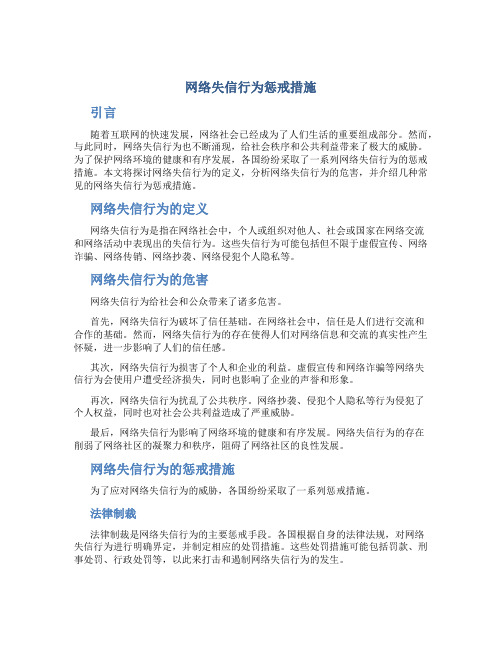
网络失信行为惩戒措施引言随着互联网的快速发展,网络社会已经成为了人们生活的重要组成部分。
然而,与此同时,网络失信行为也不断涌现,给社会秩序和公共利益带来了极大的威胁。
为了保护网络环境的健康和有序发展,各国纷纷采取了一系列网络失信行为的惩戒措施。
本文将探讨网络失信行为的定义,分析网络失信行为的危害,并介绍几种常见的网络失信行为惩戒措施。
网络失信行为的定义网络失信行为是指在网络社会中,个人或组织对他人、社会或国家在网络交流和网络活动中表现出的失信行为。
这些失信行为可能包括但不限于虚假宣传、网络诈骗、网络传销、网络抄袭、网络侵犯个人隐私等。
网络失信行为的危害网络失信行为给社会和公众带来了诸多危害。
首先,网络失信行为破坏了信任基础。
在网络社会中,信任是人们进行交流和合作的基础。
然而,网络失信行为的存在使得人们对网络信息和交流的真实性产生怀疑,进一步影响了人们的信任感。
其次,网络失信行为损害了个人和企业的利益。
虚假宣传和网络诈骗等网络失信行为会使用户遭受经济损失,同时也影响了企业的声誉和形象。
再次,网络失信行为扰乱了公共秩序。
网络抄袭、侵犯个人隐私等行为侵犯了个人权益,同时也对社会公共利益造成了严重威胁。
最后,网络失信行为影响了网络环境的健康和有序发展。
网络失信行为的存在削弱了网络社区的凝聚力和秩序,阻碍了网络社区的良性发展。
网络失信行为的惩戒措施为了应对网络失信行为的威胁,各国纷纷采取了一系列惩戒措施。
法律制裁法律制裁是网络失信行为的主要惩戒手段。
各国根据自身的法律法规,对网络失信行为进行明确界定,并制定相应的处罚措施。
这些处罚措施可能包括罚款、刑事处罚、行政处罚等,以此来打击和遏制网络失信行为的发生。
社会公示社会公示是一种常见的网络失信行为惩戒手段。
通过将网络失信行为的相关信息公之于众,可以对行为人形成社会舆论压力,促使其改正错误行为。
在某些国家和地区,政府部门或行业协会会定期发布网络失信行为的黑名单,公布网络失信行为的人员和机构的名单,以警示其他人。
关于梯若尔的认识
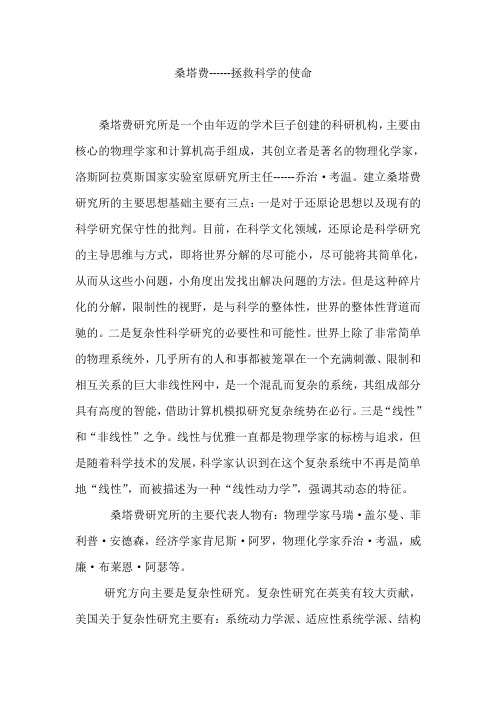
桑塔费------拯救科学的使命桑塔费研究所是一个由年迈的学术巨子创建的科研机构,主要由核心的物理学家和计算机高手组成,其创立者是著名的物理化学家,洛斯阿拉莫斯国家实验室原研究所主任------乔治·考温。
建立桑塔费研究所的主要思想基础主要有三点:一是对于还原论思想以及现有的科学研究保守性的批判。
目前,在科学文化领域,还原论是科学研究的主导思维与方式,即将世界分解的尽可能小,尽可能将其简单化,从而从这些小问题,小角度出发找出解决问题的方法。
但是这种碎片化的分解,限制性的视野,是与科学的整体性,世界的整体性背道而驰的。
二是复杂性科学研究的必要性和可能性。
世界上除了非常简单的物理系统外,几乎所有的人和事都被笼罩在一个充满刺激、限制和相互关系的巨大非线性网中,是一个混乱而复杂的系统,其组成部分具有高度的智能,借助计算机模拟研究复杂统势在必行。
三是“线性”和“非线性”之争。
线性与优雅一直都是物理学家的标榜与追求,但是随着科学技术的发展,科学家认识到在这个复杂系统中不再是简单地“线性”,而被描述为一种“线性动力学”,强调其动态的特征。
桑塔费研究所的主要代表人物有:物理学家马瑞·盖尔曼、菲利普·安德森,经济学家肯尼斯·阿罗,物理化学家乔治·考温,威廉·布莱恩·阿瑟等。
研究方向主要是复杂性研究。
复杂性研究在英美有较大贡献,美国关于复杂性研究主要有:系统动力学派、适应性系统学派、结构基础学派;英国有一个复杂科学论坛,论题包括突现的设计、复杂性理论的应用、复杂性与技术、创新的组织、组织设计等。
关于复杂科学的经典著作有Forester的《系统动力学》,Peter Senge 的《第五项修炼》,Bran Athur 的《经济中的递增回报与路径依存》,《确定性的终结》,M·盖尔曼的《从夸克到美洲豹》、《数字不确定性的终结》等。
其中,桑塔费研究所对于复杂性与新经济学的研究对于当代经济研究起到了冲击性与引导性的作用。
死刑是否应被废除英语作文
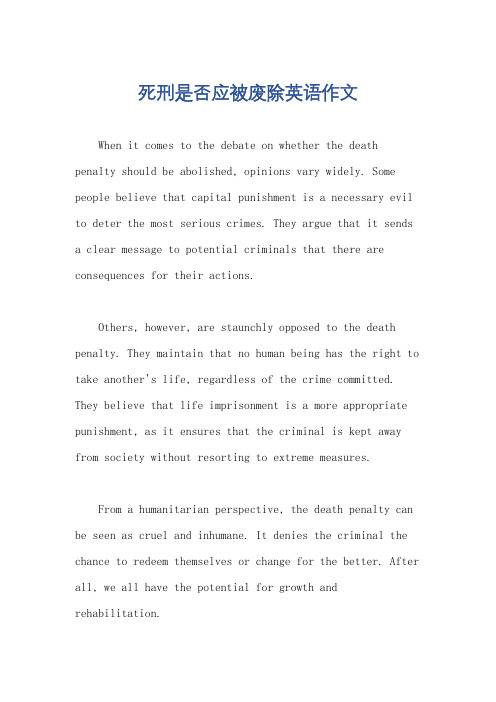
死刑是否应被废除英语作文When it comes to the debate on whether the death penalty should be abolished, opinions vary widely. Some people believe that capital punishment is a necessary evil to deter the most serious crimes. They argue that it sends a clear message to potential criminals that there are consequences for their actions.Others, however, are staunchly opposed to the death penalty. They maintain that no human being has the right to take another's life, regardless of the crime committed. They believe that life imprisonment is a more appropriate punishment, as it ensures that the criminal is kept away from society without resorting to extreme measures.From a humanitarian perspective, the death penalty can be seen as cruel and inhumane. It denies the criminal the chance to redeem themselves or change for the better. After all, we all have the potential for growth and rehabilitation.On the flip side, supporters of the death penalty argue that it provides a sense of justice for victims and their families. They believe that executing the most heinous criminals is the only way to truly ensure that they never hurt anyone again.Ultimately, the decision on whether to abolish the death penalty is a complex one. It requires balancing various considerations, including deterrence, retribution, and the potential for rehabilitation. Whatever decision is made, it's important to ensure that justice is served in a fair and humane manner.。
《半泽直树》:我们为什么爱看复仇剧

《半泽直树》:我们为什么爱看复仇剧“以牙还牙、加倍奉还!”身为一个银行员……不,是身为一个科学传播者,在看《半泽直树》这部描述银行生态的热播日剧时,脑中的某些开关好像被启动了,或许是被紧张紧凑的专业斗智复仇剧情吸引,又或许是同样身为男性白领工作者,随着剧情产生代入感。
每一次半泽直树深沉的咬牙抿嘴、或是张扬的发飙怒吼,总是让我心有戚戚。
看着半泽直树智取对手,成功复仇,把钱连本带利要回来,感觉公道终于得以伸张,银行职员又再一次保护地球免于外星人/坏心眼无脑上司跟客户的侵袭!复仇是甜美的,复仇的故事也总是最能吸引观众。
好久以前的《包青天》或是许多热门的本土剧、韩剧,都以复仇为戏剧的主轴。
复仇需要缜密的计划、深藏不漏的心机,若能像《半泽直树》这样加入专业领域知识的包装,往往会比单纯的反击更好看。
事实上,银行职员的复仇故事可能真是绝配,因为人类演化出的复仇机制就是一个缜密计算的过程。
日剧《半泽直树》讲的是一个复仇的故事。
图片来源网络喜欢看“复仇剧”源于“利他型惩罚”复仇之所以会存在于人类社会中,是为了确保社会正常运作,让那些对社会造成伤害的人知道他们的行为是需要承担后果的,而这机制也写入了我们的生理机能。
2004年8月27日发表在《科学》上的一则研究,就解释了“利他型惩罚”(altruistic punishment)的脑部运作机制。
利他型惩罚是指,虽然我们并不会从中获得直接利益,但依然会想要惩罚那些背叛或破坏社会规范的人和行为,就像我们看复仇剧码看得很过瘾一样。
这则研究的作者恩斯特·菲尔(Ernst Fehr)当时是瑞士苏黎士大学实证经济研究所的主任,他的研究团队根据文献探讨,认为人们通过进行利他型惩罚得到的满足感是社会的黏合剂,陌生人之间会因为利他型惩罚而更团结合作,以前的实验中更显示如果把利他型惩罚移除,将会拆散陌生人之间的合作关系。
根据这个前提,他们设计了一个很精密的实验方式:研究团队将做了特殊记号的液体注入受试者血管內,然后通过正电子发射断层扫描(PET)来看血液在大脑中的移动,脑区的血流量越大,代表该区域耗氧量越高,活动也越激烈。
丘吉尔二战著名演讲
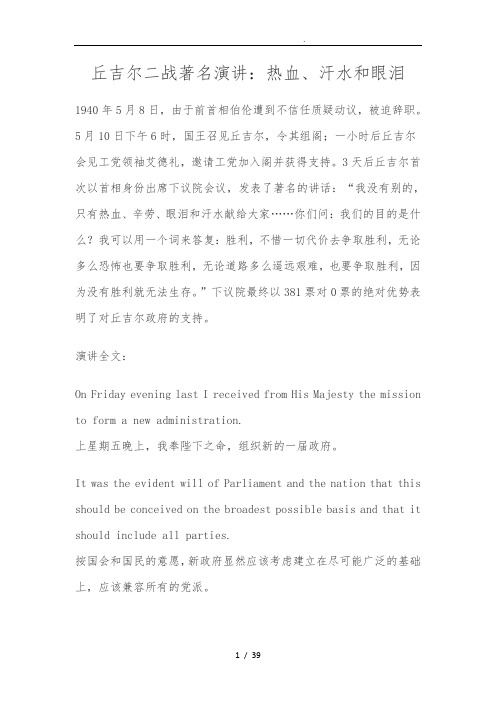
丘吉尔二战著名演讲:热血、汗水和眼泪1940年5月8日,由于前首相伯伦遭到不信任质疑动议,被迫辞职。
5月10日下午6时,国王召见丘吉尔,令其组阁;一小时后丘吉尔会见工党领袖艾德礼,邀请工党加入阁并获得支持。
3天后丘吉尔首次以首相身份出席下议院会议,发表了著名的讲话:“我没有别的,只有热血、辛劳、眼泪和汗水献给大家……你们问:我们的目的是什么?我可以用一个词来答复:胜利,不惜一切代价去争取胜利,无论多么恐怖也要争取胜利,无论道路多么遥远艰难,也要争取胜利,因为没有胜利就无法生存。
”下议院最终以381票对0票的绝对优势表明了对丘吉尔政府的支持。
演讲全文:On Friday evening last I received from His Majesty the mission to form a new administration.上星期五晚上,我奉陛下之命,组织新的一届政府。
It was the evident will of Parliament and the nation that this should be conceived on the broadest possible basis and that it should include all parties.按国会和国民的意愿,新政府显然应该考虑建立在尽可能广泛的基础上,应该兼容所有的党派。
I have already completed the most important part of this task.A war cabinet has been formed of five members, representing, with the Labor, Opposition and Liberals, the unity of the nation. 我已经完成了这项任务的最主要的部分。
战时阁已由五人组成,包括工党、反对党和自由党,这体现了举国团结一致。
“大公无私”背后的事儿
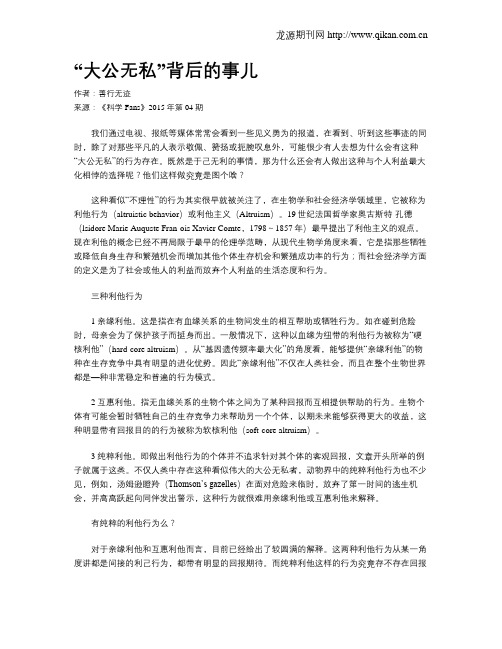
“大公无私”背后的事儿作者:善行无迹来源:《科学Fans》2015年第04期我们通过电视、报纸等媒体常常会看到一些见义勇为的报道,在看到、听到这些事迹的同时,除了对那些平凡的人表示敬佩、赞扬或扼腕叹息外,可能很少有人去想为什么会有这种“大公无私”的行为存在。
既然是于己无利的事情,那为什么还会有人做出这种与个人利益最大化相悖的选择呢?他们这样做究竟是图个啥?这种看似“不理性”的行为其实很早就被关注了,在生物学和社会经济学领域里,它被称为利他行为(altruistic behavior)或利他主义(Altruism)。
19世纪法国哲学家奥古斯特·孔德(lsidore Marie Auquste Fran·ois Xavier Comte,1798~1857年)最早提出了利他主义的观点。
现在利他的概念已经不再局限于最早的伦理学范畴,从现代生物学角度来看,它是指那些牺牲或降低自身生存和繁殖机会而增加其他个体生存机会和繁殖成功率的行为;而社会经济学方面的定义是为了社会或他人的利益而放弃个人利益的生活态度和行为。
三种利他行为1 亲缘利他。
这是指在有血缘关系的生物间发生的相互帮助或牺牲行为。
如在碰到危险时,母亲会为了保护孩子而挺身而出。
一般情况下,这种以血缘为纽带的利他行为被称为“硬核利他”(hard-core altruism)。
从“基因遗传频率最大化”的角度看,能够提供“亲缘利他”的物种在生存竞争中具有明显的进化优势。
因此“亲缘利他”不仅在人类社会,而且在整个生物世界都是—种非常稳定和普遍的行为模式。
2 互惠利他。
指无血缘关系的生物个体之间为了某种回报而互相提供帮助的行为。
生物个体有可能会暂时牺牲自己的生存竞争力来帮助另一个个体,以期未来能够获得更大的收益,这种明显带有回报目的的行为被称为软核利他(soft-core altruism)。
3 纯粹利他。
即做出利他行为的个体并不追求针对其个体的客观回报,文章开头所举的例子就属于这类。
严惩相关人员英语作文模板

严惩相关人员英语作文模板英文回答:Strict Punishment for Related Personnel。
In the wake of a major incident or scandal, it is often imperative to hold those responsible accountable. Strict punishment serves several important purposes, including deterring future misconduct, upholding justice, andrestoring public trust.Deterrence。
One of the primary goals of punishment is to deter individuals from engaging in similar offenses in the future. By imposing severe consequences on those who have committed wrongdoing, authorities send a clear message that such behavior will not be tolerated. This can effectively discourage potential offenders from engaging in similar actions and help to maintain order and stability withinsociety.Justice。
Strict punishment also serves the purpose of upholding justice. When individuals are held accountable for their actions, it demonstrates that the rule of law prevails and that no one is above it. This principle of equality before the law is essential for maintaining a fair and just society. Holding those responsible to account ensures that they are not shielded from the consequences of their actions and that justice is served for victims and society as a whole.Public Trust。
以人性为主题的英语作文

In the tapestry of life, the thread of humanity weaves through every pattern, binding us together in a complex web of emotions, actions, and consequences. Human nature is a profound subject that has intrigued philosophers, writers, and thinkers for centuries. It encompasses the spectrum of our behaviors, from the altruistic to the selfish, from the compassionate to the cruel. My journey through understanding the depths of human nature has been both enlightening and humbling.Growing up, I was always fascinated by the stories of heroes and villains, the good and the bad, that filled the pages of my books and the screens of my television. I wondered what drove people to act in such divergent ways. Was it their upbringing, their environment, or simply an inherent part of who they were? This curiosity led me to delve into literature, psychology, and history to find answers.One of the most striking examples of human nature that I encountered was in the works of Charles Dickens. His characters, from the noble and selfsacrificing Nell in The Old Curiosity Shop to the ruthless and greedy Fagin in Oliver Twist, painted a vivid picture of the duality within us. It was not just the characters themselves, but the reactions of society to them that intrigued me. How could people turn a blind eye to the suffering of others, yet rally around those who showed kindness and generosity?My exploration of human nature took a more personal turn when I volunteered at a local homeless shelter during my high school years. There, I witnessed acts of kindness that defied the harsh realities of life. Volunteers would come in, not for recognition or reward, but simply tooffer a helping hand to those in need. Yet, I also saw the other side of human nature the indifference of passersby who would walk by without a second glance at the suffering individuals on the street.This dichotomy led me to question the balance between selfinterest and altruism. Are we inherently selfish, or is there a capacity for selflessness within us all? I found some answers in the field of evolutionary psychology, which suggests that our behaviors are shaped by our need to survive and reproduce. Altruism, in this view, is a strategy that can enhance our chances of survival by promoting cooperation within a group.However, this explanation did not fully satisfy my quest for understanding.I turned to the stories of everyday heroes, like the firefighters who run into burning buildings to save lives, or the teachers who dedicate their lives to educating children in remote areas. Their actions seemed to transcend the basic instinct for selfpreservation, pointing to a deeper well of compassion and empathy within the human spirit.One incident that particularly struck me was the story of a young man who dove into a river to save a strangers child, even though he could not swim. His selfless act cost him his life, but it saved the child. This story challenged the notion that we are solely driven by selfinterest. It suggested that there is a part of us that is capable of extraordinary acts of bravery and sacrifice.As I continued to ponder the complexities of human nature, I came across the concept of moral development, as proposed by psychologist Lawrence Kohlberg. He suggested that our moral reasoning evolves through stages,from a focus on avoiding punishment to an understanding of universal ethical principles. This framework helped me see that our capacity for empathy and moral reasoning is not static but can grow and develop over time.In conclusion, my journey through the labyrinth of human nature has been a profound and humbling experience. It has shown me that we are capable of both great kindness and terrible cruelty, and that our actions are influenced by a complex interplay of factors, including our environment, upbringing, and personal experiences. It has also shown me that there is a capacity for growth and change within us, a potential for moral development that can lead us to act in ways that are greater than our individual selves. As I continue to navigate the complexities of life, I am inspired by the examples of those who embody the best of human nature and strive to cultivate that within myself.。
抓捕外星人英语作文高中
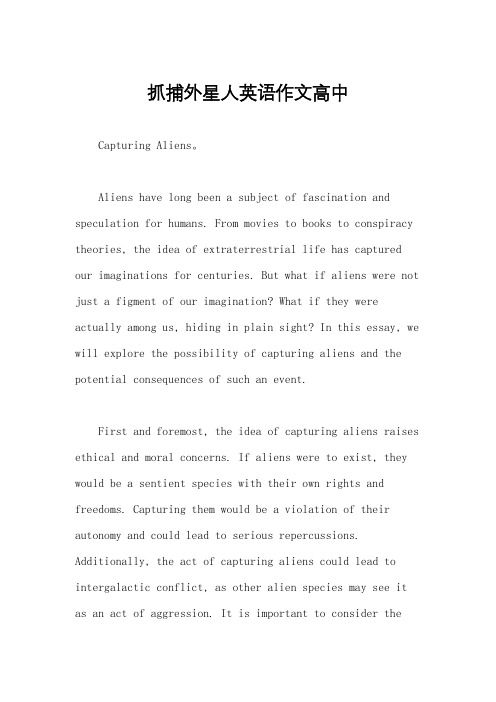
抓捕外星人英语作文高中Capturing Aliens。
Aliens have long been a subject of fascination and speculation for humans. From movies to books to conspiracy theories, the idea of extraterrestrial life has captured our imaginations for centuries. But what if aliens were not just a figment of our imagination? What if they were actually among us, hiding in plain sight? In this essay, we will explore the possibility of capturing aliens and the potential consequences of such an event.First and foremost, the idea of capturing aliens raises ethical and moral concerns. If aliens were to exist, they would be a sentient species with their own rights and freedoms. Capturing them would be a violation of their autonomy and could lead to serious repercussions. Additionally, the act of capturing aliens could lead to intergalactic conflict, as other alien species may see it as an act of aggression. It is important to consider thepotential consequences of our actions before attempting to capture aliens.Furthermore, the technology and resources required to capture aliens would be immense. We would need to develop advanced space travel capabilities, as well as the means to track and locate alien life forms. This would require significant investment and collaboration on a global scale. Additionally, we would need to consider the impact of capturing aliens on our own planet. Would they pose athreat to our environment or our way of life? These are all important considerations that must be taken into account before attempting to capture aliens.On the other hand, capturing aliens could also lead to significant scientific advancements. Studying alien life forms could provide us with valuable insights into the origins of life and the potential for life on other planets. It could also open up new avenues for technological innovation and exploration. By capturing aliens, we could potentially unlock the secrets of the universe and expand our understanding of the cosmos.In conclusion, the idea of capturing aliens is a complex and controversial topic. While it raises ethical and moral concerns, it also presents the opportunity for scientific discovery and advancement. As we continue to explore the possibility of extraterrestrial life, it is important to approach the idea of capturing aliens with caution and consideration for the potential consequences. Only time will tell whether we are truly alone in the universe, or if we are on the brink of a groundbreaking discovery that could change the course of human history.。
打击人口拐卖英语作文
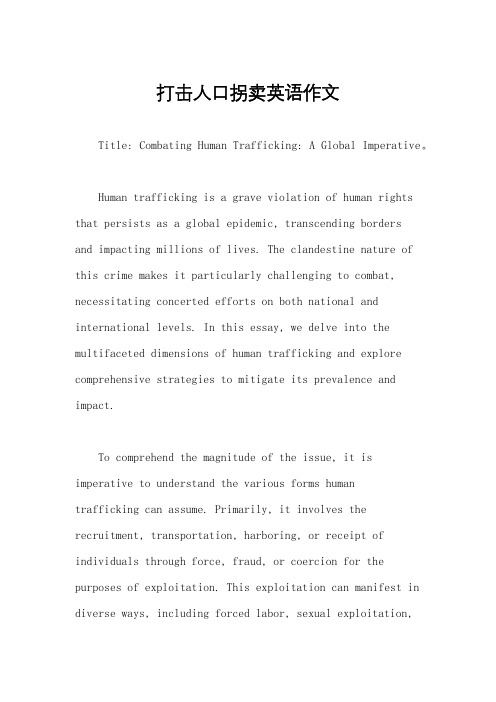
打击人口拐卖英语作文Title: Combating Human Trafficking: A Global Imperative。
Human trafficking is a grave violation of human rights that persists as a global epidemic, transcending bordersand impacting millions of lives. The clandestine nature of this crime makes it particularly challenging to combat, necessitating concerted efforts on both national and international levels. In this essay, we delve into the multifaceted dimensions of human trafficking and explore comprehensive strategies to mitigate its prevalence and impact.To comprehend the magnitude of the issue, it is imperative to understand the various forms humantrafficking can assume. Primarily, it involves the recruitment, transportation, harboring, or receipt of individuals through force, fraud, or coercion for the purposes of exploitation. This exploitation can manifest in diverse ways, including forced labor, sexual exploitation,forced marriage, or organ trafficking. The victims, often vulnerable individuals such as women, children, migrants, and refugees, endure unimaginable suffering, stripped of their autonomy and dignity.One of the foremost steps in combating humantrafficking is raising awareness and fostering a deeper understanding of its complexities. Education plays apivotal role in empowering communities to recognize the signs of trafficking, thereby facilitating early intervention and prevention. By incorporating comprehensive human rights education into school curricula and public awareness campaigns, societies can cultivate a culture of vigilance and solidarity against trafficking networks.Legislation and law enforcement efforts are indispensable in holding perpetrators accountable and providing justice for victims. Strengthening legal frameworks to criminalize all forms of trafficking, including labor exploitation and forced marriage, is paramount. Moreover, enhancing cross-border cooperation and intelligence sharing among law enforcement agencies isessential to dismantle transnational trafficking networks and apprehend traffickers.In addition to punitive measures, holistic support mechanisms must be established to rehabilitate and reintegrate survivors into society. This entails providing access to comprehensive medical care, psychosocial support, legal assistance, and vocational training. Empowering survivors to rebuild their lives and pursue livelihood opportunities is instrumental in breaking the cycle of exploitation and preventing re-victimization.Furthermore, addressing the root causes of human trafficking is imperative for long-term prevention. Poverty, inequality, conflict, displacement, and lack of economic opportunities exacerbate vulnerabilities to trafficking. Therefore, investing in poverty alleviation programs, equitable development initiatives, and social protection mechanisms can mitigate the socio-economic conditions that fuel trafficking.International cooperation and collaboration areindispensable in tackling human trafficking, given its transnational nature. Platforms such as the United Nations Office on Drugs and Crime (UNODC) and the International Labour Organization (ILO) facilitate dialogue, knowledge-sharing, and capacity-building among countries.Multilateral initiatives, such as the UN Protocol to Prevent, Suppress and Punish Trafficking in Persons, provide a comprehensive framework for global action against trafficking.Moreover, partnerships between governments, civil society organizations, academia, and the private sector are crucial for leveraging resources and expertise in combating trafficking. Engaging with technology companies to develop innovative tools for identifying and disrupting trafficking networks, such as data analytics and blockchain technology, holds immense potential in enhancing anti-trafficking efforts.In conclusion, eradicating human trafficking requires a concerted and multi-dimensional approach encompassing prevention, protection, prosecution, and partnerships. Byfostering a culture of zero tolerance towards exploitation and upholding the principles of human dignity and rights, we can strive towards a world where every individual is free from the shackles of trafficking. Only through collective action and unwavering commitment can we fulfill our moral obligation to combat this heinous crime and ensure justice for all victims of trafficking.。
利他主义的科学诠释与文化传承

利他主义的科学诠释与文化传承作者:刘鹤玲陈净来源:《江汉论坛》2008年第06期摘要:在自然选择作用下进化出来的人类心智和人类行为不仅与自私心相容,同时也与利他心相容。
利他主义是人性的一部分,不需要违背人性去凭空创造,只需要良好的文化氛围去发掘,让其发扬光大,成为维系社会和谐的润滑剂。
因此,当今社会不仅要大力提倡利他主义美德,还要科学诠释利他主义的内涵和有效的传承机制,突破利他主义传统的伦理道德观念和框架,树立利他主义的新理念,以推动社会规范的调整、社会矛盾和社会冲突的化解以及社会主义和谐社会的构建。
关键词:困境;利他主义;科学诠释;文化传承中图分类号:B80-02文献标识码:A文章编号:1003-854X(2008)06-0032-04在西方文化传统中,关于人本善与人本恶的争论由来已久。
无论人性本质是善是恶,社会普遍存在的友爱、关怀与舍己为人的美德是不争的事实。
19世纪孔德(Auguste Comte)创造利他主义(altruism)一词,正是为了颂扬为他人做出牺牲的高尚品德和情操,并以此作为人类行为方式的准则和评判人性善恶标准的伦理学基础。
之后,利他主义在抑制极端的利己主义、拜金主义和享乐主义的进一步膨胀方面起到了积极的作用,无疑是一种进步的行为价值观。
但是,传统利他主义的道德观片面强调为他人做出牺牲,完全忽视个人利益而陷入道德与利益的困境。
本文从生物学、经济学和社会文化等方面分析利他主义及其传承机制,阐述利他与利己、利他与社会之间的利益关系,改变利他仅仅意味着牺牲个人利益的传统观念,强调在与他人合作的基础上追求自身利益也是正当和道德的行为,是利他主义的一种表现形式。
由此超越利己与利他纯道德的善恶评判标准,树立利他也是为了更利己的新理念,使利他主义走出伦理道德的困境。
一、生物学意义上的利他主义生物学意义上的利他主义是指个体牺牲自身适合度而提高其他个体适合度的行为,适合度是指个体的存活能力和繁殖能力。
禁毒警示语英语
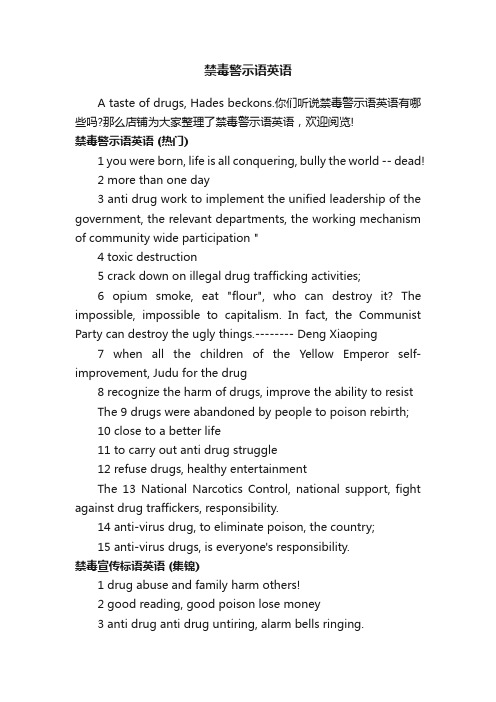
禁毒警示语英语A taste of drugs, Hades beckons.你们听说禁毒警示语英语有哪些吗?那么店铺为大家整理了禁毒警示语英语,欢迎阅览!禁毒警示语英语 (热门)1 you were born, life is all conquering, bully the world -- dead!2 more than one day3 anti drug work to implement the unified leadership of the government, the relevant departments, the working mechanism of community wide participation "4 toxic destruction5 crack down on illegal drug trafficking activities;6 opium smoke, eat "flour", who can destroy it? The impossible, impossible to capitalism. In fact, the Communist Party can destroy the ugly things.-------- Deng Xiaoping7 when all the children of the Yellow Emperor self-improvement, Judu for the drug8 recognize the harm of drugs, improve the ability to resistThe 9 drugs were abandoned by people to poison rebirth;10 close to a better life11 to carry out anti drug struggle12 refuse drugs, healthy entertainmentThe 13 National Narcotics Control, national support, fight against drug traffickers, responsibility.14 anti-virus drug, to eliminate poison, the country;15 anti-virus drugs, is everyone's responsibility.禁毒宣传标语英语 (集锦)1 drug abuse and family harm others!2 good reading, good poison lose money3 anti drug anti drug untiring, alarm bells ringing.4 action to participate in the anti drug people's War5 no drug trafficking efforts to achieve no no no toxic drug targets.6 resolutely eradicate the illegal cultivation of opium poppy and other medicinal plants7 a lifetime of regret drugs, Mo take life bet tomorrow;8 vigorously promote the comprehensive management9 resolutely resist drugs10 away from new drugs, health achievements in the future11 resolutely fight for a period of three years of the people's war against drugs12 households commitment13 to carry out activities to create non-toxic entertainment, to ensure that a pure land;Four the prohibition of simultaneous closure of the 14 sources of law enforcement and strict closure of the law15 participate in the fight against drugs and create a harmonious life16 "drug law > sword of Damocles, drug destruction17 drug trafficking, regardless of the number of criminal responsibility shall be investigated18 mass action, and actively report drug-related crimes!19 refuse drugs, in the contemporary era, will benefit future generations.20 dig your own grave禁毒温馨警示语英语 (最新)1 resistance to drugs, away from poisonIs the 2 drug addiction is killed for his money, Dutch act3 concentric away from drugs, sharing a better life4 to eliminate the harm of drugs, to create peace inFenggang5 people were hurt. (beverages, absorbing drugs on the human body has serious harm to the brain, causing serious drug taste, Hades beckons6 create a non-toxic community,7 protect people's physical and mental health8 cherish life, away from drugs, to become civilized youth9 with love hope, resist evil intentions.10 actively participate in anti drug work11 "drug control is the common responsibility of the whole society. State organs, social organizations, enterprises, institutions and other organizations and citizens shall, in accordance with the provisions of this Law and relevant laws and regulations, perform their duties or obligations"12 to carry out comprehensive treatment to eradicate the harm of drugs!13 away from drugs, close to a better life14 drugs are a nuisance to human society15 drugs are not commodities, prohibit the sale of drugs is not food, avoid tasting!。
生物的本能

Dominique J.-F. de Quervain et al., The Neural Basis of Altruistic Punishment, 305 Science 1254-1258 (2004)
倘A知悉B係非基於自由意志(即N組)者, A不公平之感覺 或欲懲罰B之意願即相對地低。
Dominique J.-F. de Quervain et al., The Neural Basis of Altruistic Punishment, 305 Science 1254-1258 (2004)
於須付出代價以有效懲罰B之組別(即IC), 腦部滿足感 區域活化強度與所付出之代價成正比
❖ 試由基因單位看,則生物體內多餘DNA 之存在則有其理由
❖ 演化不必然只是物種之存續聖戰,也可 以是基因單位的戰爭
Other-Regarding(利他)
❖ 除利己行為外,社會生物學家更注意到一種 發生於近親族群(kin group)中願意犧牲自我 的行為,藉以換得與其攜帶近似基因的生物 群體得以繼續繁衍與生存等更大利益,並臆 測此行為應由一種「利他基因(altruism gene)」所控制。
Dominique J.-F. de Quervain et al., The Neural Basis of Altruistic Punishment, 305 Science 1254-1258 (2004)
結論:
人在進行利他性懲罰時,其腦部與進行 目標導向的行動時取得報償「滿足感」 有關的dorsal striatum 處於活化狀態, 且活化程度與人類願意為利他性懲罰付 出的代價成正比 。
實驗設計:A (n=15) 與B (n=7)各有10U金錢
(1)若A選擇將10U給B,則B將 額外獲得40U (亦即共得利 50U), 此時, B可選擇全部 保有50U或是退還25U給A
世界不完美英语作文初三

As a high school student, Ive come to realize that the world is far from perfect. Its a lesson that has been etched into my consciousness through various experiences and observations. The world is a complex tapestry woven with threads of beauty and imperfection, and understanding this has been a journey of growth for me.Growing up, I was surrounded by a loving family and a community that seemed to be the epitome of harmony. However, as I ventured out of my comfort zone and interacted with a broader spectrum of society, I encountered the stark reality of the worlds imperfections. The first time I truly grasped this was during a school trip to a less fortunate neighborhood. The contrast between the lives of my peers and the children living there was jarring. It was a stark reminder that not everyone has the same opportunities or access to resources, and this disparity is a glaring imperfection in our world.Another instance that highlighted the worlds imperfections was when I volunteered at a local animal shelter. The number of abandoned and abused animals was heartbreaking. It was a stark reminder of the cruelty and negligence that exists in society. The fact that these innocent creatures suffer at the hands of humans is a testament to the flaws in our moral compass.In school, we are often taught about the wonders of the world and the potential for greatness. However, the reality is that the world is plagued with issues such as poverty, inequality, and environmental degradation. These are not just distant problems they are issues that affect people inour own communities. The news is filled with stories of natural disasters, wars, and social injustices, painting a picture of a world that is far from the utopia we often envision.Despite these imperfections, I believe that it is important to acknowledge and address them rather than ignore them. It is through recognizing the flaws in our world that we can strive to make a difference. For instance, I have seen classmates and friends take initiative to raise awareness about social issues, volunteer for community service, and advocate for environmental conservation. These actions, no matter how small they may seem, contribute to the collective effort to make the world a better place.Moreover, the worlds imperfections can also serve as a source of inspiration and motivation. They remind us of the work that still needs to be done and the potential for positive change. It is through these challenges that we can grow as individuals and as a society. The pursuit of perfection may be an unattainable goal, but the journey towards it can lead to significant progress and personal development.In conclusion, the worlds imperfections are a reality that we must confront and learn from. They are a call to action for us to contribute to the betterment of society and the environment. While the world may not be perfect, it is our collective responsibility to strive for improvement and work towards creating a more just and harmonious world. It is through acknowledging and addressing these imperfections that we can hope to make a positive impact and leave a legacy for future generations.。
- 1、下载文档前请自行甄别文档内容的完整性,平台不提供额外的编辑、内容补充、找答案等附加服务。
- 2、"仅部分预览"的文档,不可在线预览部分如存在完整性等问题,可反馈申请退款(可完整预览的文档不适用该条件!)。
- 3、如文档侵犯您的权益,请联系客服反馈,我们会尽快为您处理(人工客服工作时间:9:00-18:30)。
1.University of Zürich, Institute for Empirical Research in Economics, Blümlisalpstrasse 10, CH-8006
Zürich, Switzerland
2.University of St Gallen, FEW-HSG, Varnbüelstrasse 14, CH-9000 St Gallen, Switzerland
Correspondence to: Ernst Fehr1 Correspondence and requests for materials should be
addressed to E.F. (e-mail: Email: efehr@iew.unizh.ch).
Top of page
Abstract
Human cooperation is an evolutionary puzzle. Unlike other creatures, people
frequently cooperate with genetically unrelated strangers, often in large groups, with people they will never meet again, and when reputation gains are small or absent. These patterns of cooperation cannot be explained by the nepotistic
motives associated with the evolutionary theory of kin selection and the selfish motives associated with signalling theory or the theory of reciprocal altruism. Here we show experimentally that the altruistic punishment of defectors is a key motive for the explanation of cooperation. Altruistic punishment means that individuals punish, although the punishment is costly for them and yields no material gain. We show that cooperation flourishes if altruistic punishment is possible, and breaks down if it is ruled out. The evidence indicates that negative emotions towards defectors are the proximate mechanism behind altruistic punishment. These
results suggest that future study of the evolution of human cooperation should include a strong focus on explaining altruistic punishment.
Nature415, 137-140 (10 January 2002) | doi:10.1038/415137a; Received 5 October 2001;
Accepted 5 November 2001。
